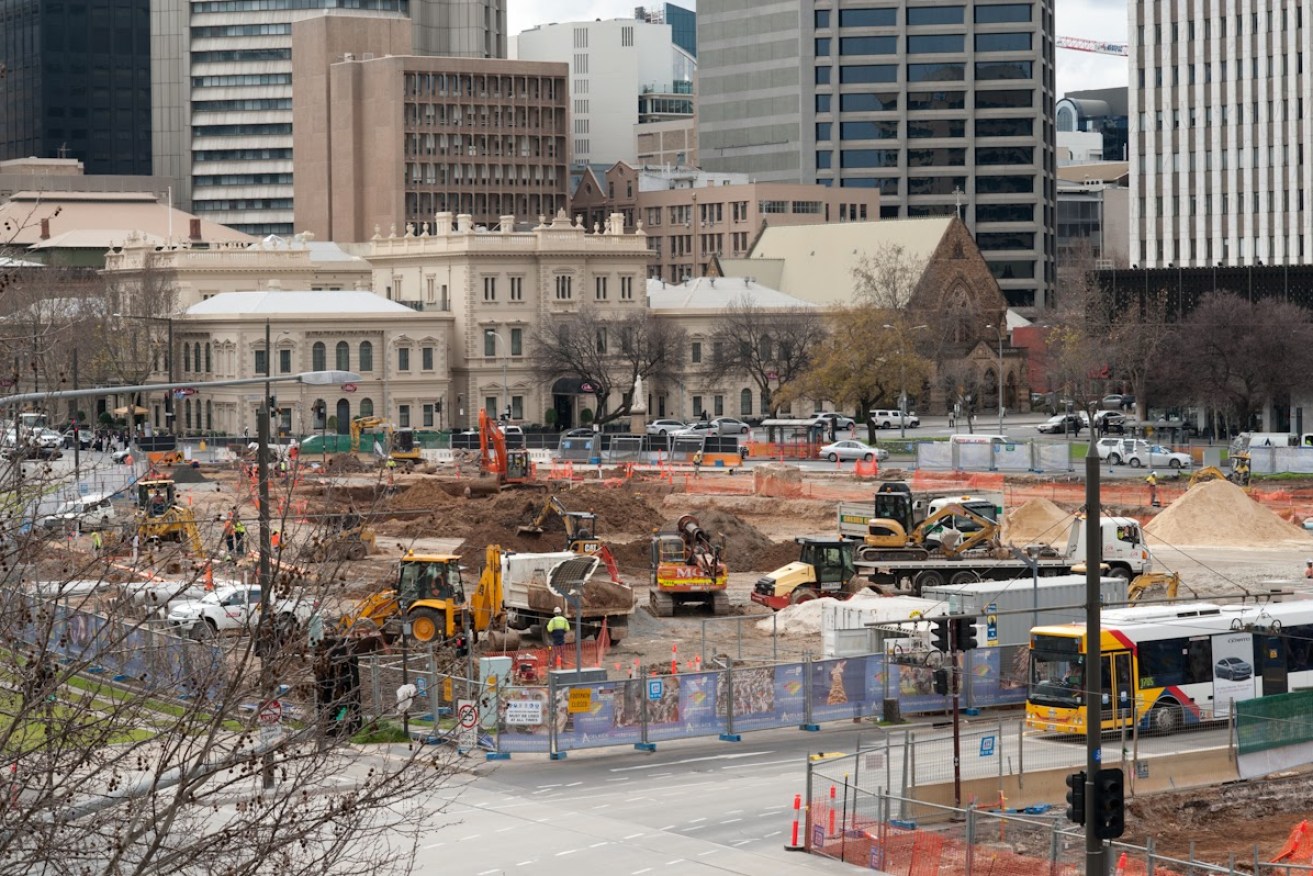Motorists defy speed limit on “slippery” Victoria Square road
The majority of drivers have been defying a 25kph speed zone along a slippery Victoria Square road – and now the city council is considering lifting the speed limit.


Victoria Square during the 'stage one' upgrades. The road dividing the square (bottom right) was later paved with granite. Photo: Nat Rogers / InDaily
The Adelaide City Council installed “slippery road” signs and halved the speed limit to 25kph along Reconciliation Plaza in late 2014, after its granite pavers were found to be a slip hazard for vehicles.
But most motorists have been defying the road-works-style speed limit, with the majority recorded travelling at between 35 and 40kph, a series of council-commissioned traffic surveys has found.
The council will tonight consider a proposal, by its staff, to ask the Department of Planning, Transport and Infrastructure (DPTI) for a permanent increase in the speed limit – to 30kph.
The proposal includes a warning that “there remains a risk that drivers will not obey” the speed limit.
But the council’s associate director of infrastructure, Phil Burton, told InDaily increasing the speed limit would keep drivers “as safe as possible” without reducing the efficiency of the east-west road.
“The full design intent of Victoria Square hasn’t been realised yet,” said Burton, adding that subsequent stages of the redevelopment – should the council or State Government choose to fund them – would include more “traffic calming” measures.
He said DPTI rules dictated that no road could retain a 25kph zone indefinitely anyway – permanent speed limits must have “a zero on the end”, he said.
RAA road safety manager Charles Mountain told InDaily he hoped the council would address the slipperiness of the pavement so that the 50kph speed limit could be returned.
However, he said 30kph was “a good compromise” that would allow drivers to get through two sets of lights more easily, rather than being stuck on the Plaza.
“Generally people heading through that area … want to get through both sets of traffic lights,” he said. “30 kilometres per hour is probably appropriate for the environment.”
The pavers were installed as part of the council’s $28 million “stage one” Victoria Square upgrades.
Council staff believed, during the design stage of the redevelopment, that the granite paving would “create a more cautionary driving environment, leading to slower speeds” along the road, which connects Grote and Wakefield streets.
A council spokesperson told InDaily this morning that “while the skid resistance – or traction – of the pavers has deteriorated since installation – common for natural stone pavers – the evaluation of performance indicates that this has plateaued to a level which is suitable for the reduced speed environment of 30kph over the longer term”.
“Our primary consideration is to ensure safety for everyone who uses the roadway,” the spokesperson said.
“There isn’t a lot of precedence of the use of stone pavers in roadways in Adelaide. These particular pavers were selected to achieve a distinctive, high-quality and robust public domain as part of the Victoria Square Master Plan.”
Lord Mayor Martin Haese declined to comment on the proposal before it is considered at tonight’s meeting, but was quoted during his 2014 election campaign as saying the slippery Victoria Square pavers raised “grave questions about the competency of Adelaide City Council to undertake these types of projects”.
At the time, he railed against the council’s “obsession for fashion over function”.
The council commissioned a contractor to undertake the speed surveys in late 2014 and early 2015.
The proposal to be presented to the council tonight also includes a $70,000 budget to install pole-mounted 30kph speed limit signs and electronic message boards to warn drivers of road conditions or event closures.
The money would also fund biannual speed surveys and fortnightly road cleaning, to prevent “grime” from making the road more slippery.




